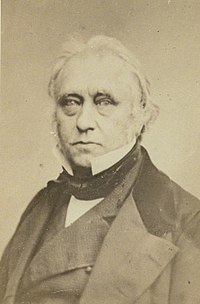Still working to recover. Please don't edit quite yet.
Macaulayism
Macaulayism is the conscious policy of liquidating indigenous culture through the planned substitution of the alien culture of a colonizing power via the education system. The term is derived from the name of British politician Thomas Babington Macaulay (1800-1859), an individual who was instrumental in the introduction of the English language (WP) as the medium of instruction in the higher education of India (WP).
History[edit]
Thomas Macaulay[edit]
Thomas Babington Macaulay was born in Wikipedia:Leicestershire, Wikipedia:England on 25 October 1800, the son of a former African Colonial Governor and anti-slavery activist.[1]
Elected to the British Wikipedia:House of Commons in 1830 as a member of the reformist Whig party, four years later Macaulay was named as an inaugural member of a governing Wikipedia:Supreme Council of India.[1] Macaulay spent the next four years in India, where he devoted his efforts to the reform of the Wikipedia:criminal code of the colony and the establishment of an educational system based upon the British model.[1]
| This article contains content from Wikipedia An article on this subject has been nominated for deletion on Wikipedia: Wikipedia:Articles for deletion/ Macaulayism Current versions of the GNU FDL article on WP may contain information useful to the improvement of this article |
WP+ NO DEL |
Macaulay held the indigenous culture of the Indian peoples in low esteem and saw his as a civilizing mission(WP): "We must at present do our best to form a class of persons Indian in blood and colour but English in tastes, in opinion, in morals, and in intellect," Macaulay declared.[2]
Not only was the English form of educational instruction directly imported to India under Macaulay's watchful eye, but the English language was established as the sole vehicle of instruction. It was hoped to establish a new cultural elite in the colony and that the ideas of this new English-speaking and British-educated group would "filter downwards" into Indian society.
On 12 October 1836, Macaulay wrote to this father in England:
"Our English schools are flourishing wonderfully; we find it difficult to provide instruction to all. The effect of this education on Hindus is prodigious. No Hindu who has received an English education ever remains sincerely attached to his religion. It is my firm belief that if our plans of education are followed up, there will not be a single idolater among the respected classes 30 years hence. And this will be effected without our efforts to proselytize; I heartily rejoice in the prospect."[2]
"Macaulayism" and modern India[edit]
In the independent nation of India which emerged in the second half of the 20th Century, Macaulay's name has become emblematic for the ills of Wikipedia:colonialism. Macaulay and the British education system have been blamed for producing a generation of Indians not proud of their distinct heritage.[3]
Speaking at a national seminar on "Decolonizing English Education" in 2001, professor Wikipedia:Kapil Kapoor of Wikipedia:Jawaharlal Nehru University declared that one of the byproducts of mainstream English language education in India today has been its tendency to "marginalize inherited learning" and to have uprooted academics from traditional Indian modes of thought, inducing in them "a spirit of self-denigration (heenabhavna)."[4]
Author Wikipedia:Rajiv Malhotra has bemoaned the "continuation of the policy on Indian education started by the famous Lord Macaulay over 150 years ago" for the virtual banishment of classic Wikipedia:Indian literature from the country's higher academic institutions and the emergence of a "new breed" of writers professing a "uniquely Indian Eurocentrism."[5]
Vestiges of Macaulayism are also seen by many Hindu nationalists as a mechanism of British neocolonial control in India. [6]
See also[edit]
Footnotes[edit]
- ↑ 1.0 1.1 1.2 "Thomas Babington Macaulay," age-of-the-sage.org/ Retrieved March 16, 2011.
- ↑ 2.0 2.1 Kum. B. Nivedita, "The Destruction of the Indian System of Education," Adapted from a speech given to the Vivekananda Study Circle, IIT-Madras, January 1998.
- ↑ Christophe Jaffrelot, Hindu Nationalist Movement and Indian Politics: 1925 to the 1990s. New York: Viking Press, 1996; page 343.
- ↑ Kapil Kapoor, "Decolonizing the Indian Mind: Keynote Address to the National Seminar on Decolonizing English Education, Department of English, North Gujarat University, Patan (Gujarat, India), February 18, 2001." veda.com/ Retrieved March 11, 2011.
- ↑ Rajiv Malhotra, "The Axis of Neocolonialism," February 12, 2006.
- ↑ Thomas M. Leonard, Encyclopedia of the Developing World: Volume 1, London: Routledge, 2005; page 1119.
